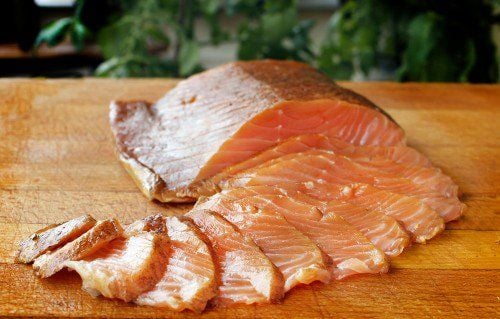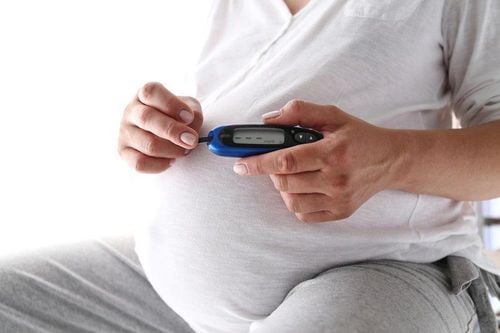This is an automatically translated article.
Some pregnant women tend to avoid eating fish due to the high levels of mercury and other contaminants found in some fish species. However, fish is a good source of lean protein, healthy fats, vitamins and minerals. The U.S. Food and Drug Administration (FDA) even recommends that pregnant and nursing women eat 8 to 12 ounces (227 to 340 grams) of low-mercury fish each week.1. Various types of smoked salmon
Smoked salmon is classified into two types, cold smoked or hot smoked depending on the specific method.
Cold Smoked Salmon: Salmon is dry cured and smoked at 70 to 90 degrees F (21 to 32 degrees C). The fish is undercooked, producing bright colors, soft textures, and rich flavors. This smoked variety is often served in salads, or bagels and toast. Hot smoke. Salmon is brine-treated and smoked at 120 degrees F (49 degrees C) until the internal temperature of the fish reaches 135 degrees F (57 degrees C) or higher. This leaves the fish fully cooked, with firm, smooth flesh and a strong smoky flavor. This hot smoked fish is often served in appetizers, or on salads and rice. In general, cold smoked salmon is undercooked while hot smoked salmon should be fully cooked. Due to the health risks of eating undercooked seafood, pregnant women should not eat cold smoked salmon.

Mẹ bầu nên ăn cá hồi hun khói nóng
2. Trademark
Smoked salmon is usually packaged in sealed bags or tin cans, usually, the food label will contain complete information about the method of smoking with which the product was processed.
Some products include a note about the pasteurization process, indicating that the fish is fully cooked. If the customer is uncertain whether the fish product is hot smoked or cold smoked, it is necessary to check with the manufacturer or call the hotline of the company that distributes the product before consuming the product.
Cold smoked salmon can also be labeled by many different names, such as: Pate, Nova Salmon, Kipper . Lox and Gravlax style salmon is salmon that has been salt-treated but not smoked or cooked.
3. Smoked salmon and pregnant women's health
A 3.5-ounce (100-gram) serving of smoked salmon provides many beneficial nutrients for pregnant women, including:
Calories: 117 Fat: 4 grams Protein: 18 grams Carbs: 0 grams Vitamin B12 : 136% of the Daily Value (DV) Vitamin D: 86% of the DV Vitamin E: 9% of the DV Selenium: 59% of the DV Iron: 5% of the DV Zinc: 3% DV Salmon is a rich source of nutrients essential nutrients for fetal growth and development, such as iodine and vitamins B12 and D.

Cá hồi là thực phẩm giàu chất dinh dưỡng
Compared to other protein sources, fish is generally higher in the omega-3 fatty acids EPA and DHA. DHA plays a particularly important role during pregnancy by supporting fetal brain function, and promoting the development of infants and children after birth.
Furthermore, numerous reviews of fish intake during pregnancy demonstrate that the benefits of eating low-mercury fish far outweigh the risks to the infant's brain development. mercury can bring. However, there are some risks associated with eating cold smoked salmon during pregnancy such as:
3.1 Risk of infection with Listeria
Eating raw or undercooked fish like cold smoked salmon can cause a number of viral, bacterial and parasitic infections. This is especially true for pregnant women, who are 18 times more likely to contract Listeria than the general population. This infection can be passed directly to the fetus through the placenta.
This infection is caused by the bacteria Listeria monocytogenes. Although symptoms appear to vary from very mild to severe in pregnant women, the disease can cause serious side effects and even death for the unborn baby. Listeria infection in pregnant women and their unborn babies can lead to:
Preterm birth Low birth weight babies Meningitis Miscarriage

Nguy cơ nhiễm khuẩn Listeria từ cá hồi có thể khiến thai sinh sinh non
Some signs of Listeria infection in pregnant women include flu-like symptoms such as fever, fatigue, and muscle aches. If a pregnant woman notices these symptoms while pregnant and suspects Listeria, she should contact a reputable hospital urgently. To reduce the risk, pregnant women should avoid raw or undercooked fish such as cold-smoked salmon, as well as other food sources such as deli meats during pregnancy.
To ensure Listeria is destroyed before consumption, users should heat even hot smoked salmon to 165 degrees F (74 degrees C) before eating.
3.2 Risk of parasitic worm infection
Eating raw or undercooked salmon also carries a risk of parasitic infections. One of the most common parasites in raw or undercooked salmon is the tapeworm. Tapeworms can cause stomach upset, nausea, diarrhea, and sudden weight loss. Can also lead to nutrient deficiencies and intestinal blockages.
The best way to kill parasites like tapeworms in salmon is to refrigerate the fish worms at -31 degrees F (-35 degrees C) for 15 hours or heat to 145 degrees F (63 degrees C).
3.3 High salt content
Both cold and hot smoked salmon undergo a salt treatment. So the final product usually contains a fairly high amount of salt. Depending on specific handling and processing methods, as little as 3.5 ounces (100 grams) of smoked salmon can contain up to 30% or more of the maximum recommended daily salt intake of 2,300 mg for women. pregnant women and healthy adults.
Với hàm lượng muối cao, mẹ bầu nên cân nhắc khi ăn cá hồi hun khói
Diets high in added salt during pregnancy have been linked to an increased risk of high blood pressure and pre-eclampsia, both of which have dangerous side effects for the mother and baby. Therefore, pregnant women should only eat foods with minimal salt content.
Vinmec International General Hospital offers a Package Maternity Care Program for pregnant women right from the first months of pregnancy with a full range of antenatal care visits, periodical 3D and 4D ultrasounds and routine tests to ensure that the mother is healthy and the fetus is developing comprehensively.
In addition to regular check-ups, pregnant women will also be advised on nutrition and exercise so that the mother can gain weight reasonably while the fetus still absorbs nutrients well. Health check-ups under the close supervision of experienced and specialized obstetricians help mothers gain more knowledge to protect their health during pregnancy as well as minimize complications affecting the mother. and child.
Reference article: Healthline.com













